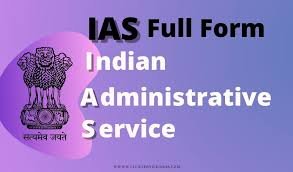Understanding IAS: Full Form, Role, and Importance
Introduction to IAS
The Indian Administrative Service (IAS) is one of the premier civil services in India, recognized for its pivotal role in the country’s administration and governance. As part of the All India Services, IAS officers are involved in various administrative and policy-making functions at both state and central levels. This article delves into the full form of IAS, its significance, and its impact on public administration in India.
Full Form and Meaning
The full form of IAS is Indian Administrative Service. Established under the framework of the Indian Constitution, IAS is a prestigious service that plays a crucial role in implementing government policies and overseeing administrative functions. IAS officers are entrusted with responsibilities ranging from district administration to central government ministries, influencing a wide range of public affairs and policies.
Key Responsibilities and Roles
IAS officers are known for their diverse roles in the Indian administrative framework. Their responsibilities include managing government affairs, implementing policies, overseeing development projects, and ensuring law and order. They are often involved in strategic planning and decision-making processes, making their role critical in shaping the nation’s administrative landscape.
Recruitment and Training
Becoming an IAS officer requires passing the Civil Services Examination conducted by the Union Public Service Commission (UPSC). This rigorous examination tests candidates on a variety of subjects, including general studies, essay writing, and optional subjects. Successful candidates undergo extensive training at the Lal Bahadur Shastri National Academy of Administration (LBSNAA) in Mussoorie, where they are equipped with the skills necessary for effective public service.
The Importance of IAS in Indian Governance
IAS officers play a vital role in maintaining the efficacy and integrity of the Indian administrative system. They are involved in the implementation of government schemes, management of public resources, and ensuring compliance with laws. Their work directly impacts the delivery of public services and the overall functioning of the government.

Why This News is Important
Understanding the IAS Role
The Indian Administrative Service (IAS) is integral to the effective functioning of the Indian government. Understanding the full form and role of IAS helps students grasp the significance of this service in shaping the nation’s policies and administration. Knowledge about IAS is crucial for those preparing for civil services exams, as it provides insight into the responsibilities and career opportunities within this esteemed service.
Recruitment Process and Training
Knowing the recruitment process and training involved in becoming an IAS officer is essential for aspirants. The Civil Services Examination is one of the toughest competitive exams in India, and understanding its structure and preparation strategies can significantly impact a candidate’s success. Insights into the training process at LBSNAA also provide a clearer picture of the journey to becoming an IAS officer.
Impact on Public Administration
IAS officers have a substantial impact on public administration, influencing policy implementation and governance. Their role in managing government affairs and ensuring effective service delivery is pivotal for the nation’s development. Awareness of their responsibilities helps students appreciate the complexity of administrative functions and the importance of effective governance.
Historical Context
Establishment of IAS
The Indian Administrative Service (IAS) was established during the British colonial period as part of the Indian Civil Service (ICS). After India gained independence in 1947, the ICS was replaced by IAS as part of the restructuring of the administrative services. The IAS was envisioned to be a neutral and efficient service capable of managing the country’s diverse administrative needs.
Evolution Over Time
Since its inception, the IAS has evolved to meet the changing demands of Indian society. The service has adapted to various political, economic, and social changes, continually working towards better governance and public administration. The evolution of IAS reflects the broader changes in India’s administrative framework and its commitment to effective public service.
Key Takeaways from Understanding IAS
| Serial Number | Key Takeaway |
|---|---|
| 1 | IAS stands for Indian Administrative Service. |
| 2 | IAS officers are involved in key administrative and policy-making roles. |
| 3 | Recruitment to IAS is through the Civil Services Examination conducted by UPSC. |
| 4 | IAS officers undergo rigorous training at LBSNAA in Mussoorie. |
| 5 | The IAS plays a crucial role in implementing government policies and managing public affairs. |
Important FAQs for Students from this News
1. What does IAS stand for?
IAS stands for Indian Administrative Service, one of the premier civil services in India responsible for administrative functions and policy implementation.
2. How can one become an IAS officer?
To become an IAS officer, one must pass the Civil Services Examination conducted by the Union Public Service Commission (UPSC). This examination includes preliminary and main exams followed by an interview.
3. What is the role of IAS officers?
IAS officers manage government affairs, implement policies, oversee development projects, ensure law and order, and participate in strategic planning and decision-making.
4. Where do IAS officers receive their training?
IAS officers receive their training at the Lal Bahadur Shastri National Academy of Administration (LBSNAA) in Mussoorie, where they are prepared for various administrative responsibilities.
5. What is the significance of IAS in Indian governance?
IAS officers play a crucial role in ensuring effective governance by implementing government policies, managing public resources, and ensuring law enforcement, which directly impacts the country’s administrative efficiency.
Some Important Current Affairs Links

















